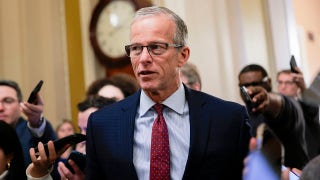Rep. McMorris Rodgers: Time for Democrats, Republicans to pull together for our country
House to vote on $3 trillion coronavirus relief bill; Washington Congresswoman Cathy McMorris Rodgers joins ‘America’s Newsroom.’
The House of Representatives enacted an unprecedented plan Friday to allow for proxy House votes and remote committee meetings during the coronavirus pandemic for the first time in history.
The vote was 217-189 in the House Friday evening, reflecting the widespread GOP objections to changing the procedures in the House.
The plan will allow for absent members to cast votes by proxy on the House floor and for committees to allow members and witnesses to join from home for 45 days. The special provisions could be renewed or modified for the remainder of the congressional term that ends in January.
DEFECTIONS IN THE HOUSE: SEVERAL DEMS TO VOTE 'NO' ON $3T CORONAVIRUS BILL
"The bottom line is that we're in the middle of a health crisis -- a pandemic," said Rep. Jim McGovern, D-Mass. "And we need to make sure that we can continue to do our work in a safe and orderly way."
But Republicans panned the move as an "unconstitutional power grab" to undo more than 230 years of House tradition.
"Our Founders would be ashamed that we aren’t assembling," House GOP Leader Kevin McCarthy, R-Calif., said, who argued that lawmakers shouldn't be paid to stay home.
"A virtual Congress would be a Congress that is connected to the Internet, but disconnected from the American people," McCarthy added.
Republicans made the case that if essential workers like police officers and health care workers are showing up to work during the pandemic, so should members of Congress.
Rep. Tom McClintock, R-Calif., said constituents elected members to vote on their behalf and not hand off their vote to a proxy "because we're too lazy or too scared to show up for work," McClintock said. "Good God, what are we doing to our country?"
PELOSI CALLS $3T CORONAVIRUS RELIEF BILL DEMOCRATS' STARTING OFFER AS WHITE HOUSE ISSUES VETO THREAT
But Democrats pointed to lawmakers and staff getting sick on Capitol Hill and noted that Washington D.C. is still under a stay-home order until June 8.
"Washington is a hot spot. It's under a stay-at-home order," Rep. Steve Cohen, D-Tenn. "You are not supposed to meet in groups of more than 10 people. We are more than 10. ... We are just protecting our members and protecting their loved ones and protecting their constituents. This is a good law. It gives people a chance to vote."
RAND PAUL RECOVERS FROM CORONAVIRUS, TESTS NEGATIVE
To highlight the risk of meeting en masse in D.C., Cohen took aim at Sen. Rand Paul, R-Ky., for testing positive for the coronavirus and who "still swam in a Senate pool and exposed everybody over there to COVID."
This resolution, Cohen said, will allow members who are older and ill to cast votes safely, like civil rights icon Rep. John Lewis, D-Ga., who is battling cancer.
Other countries have adopted rule changes during the coronavirus pandemic to allow for some remote and virtual proceedings, such as Canada, Brazil and the European Union. The British House of Commons broke 700 years of history last month by convening parliament with Zoom.
And even aspects of the U.S. government have already changed.
The Supreme Court is now holding oral arguments via telephone conference. And the U.S. Senate this week held a hybrid video conference hearing where the chairman and witnesses were zoomed into the room from their homes, including Dr. Anthony Fauci.
Democrats delayed their proxy voting plan for a month in the hope that they could reach a bipartisan deal with Republicans. But that didn't happen.
"I don't know whether my Republican friends are just intimidated by technology," said McGovern, D-Mass. "I mean, listening to some of them I think they think bifocals are a radical idea."
House Majority Leader Steny Hoyer, D-Md., said Congress must rise to the occasion and adopt new technologies and ways of conducting business during the pandemic.
"I reject ... that this is any kind of radical change," Hoyer said.
Under the new resolution, when a vote is called, members who are not in Washington will determine to whom they will “phone in” their vote on the floor to cast a ballot on behalf of the absent members.
STIMULUS CHECKS, STATE AID AND MORE: WHAT’S IN HOUSE DEMOCRATS' NEW CORONAVIRUS RELIEF BILL
No member can be responsible for casting the ballots of more than 10 proxies. That means, with a current House population of 430 members, there must be at least 43 members on the floor to cast ballots on behalf of their colleagues.
When deciding to cast a vote by proxy, members must submit a letter to the Clerk of the House, Cheryl Johnson. Members are given at least a day’s notice before voting on the final passage on any measure.
Members can revoke their planned proxy by showing up in person to vote.
DEMOCRATS' $3T CORONAVIRUS RELIEF BILL EXTENDS STIMULUS CHECKS TO CERTAIN UNDOCUMENTED IMMIGRANTS
Lawmakers who are acting as “agents” of the proxies will submit voting cards to the tally clerks in the chamber. The members holding proxies will write that “Representative ‘A’ votes 'nay' by proxy” on the card.
Proxy members may not change votes for absent members. They must carry out the wishes of their colleagues.













































